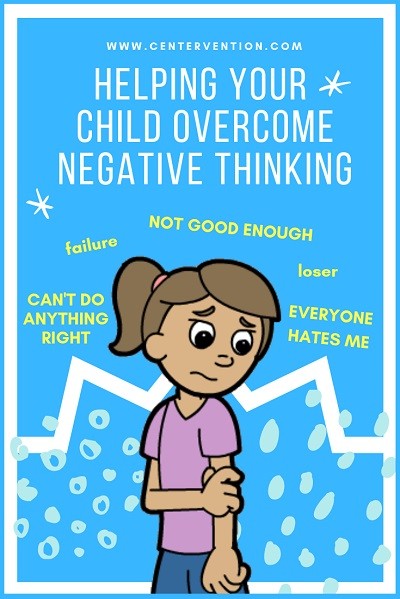
Q: Whether it’s a test at school or a new step at dance class, my daughter doesn’t think she can do anything well. She always seems to be spiraling down into this pit of negative thinking, and it’s preventing her from accomplishing or finishing just about anything. There are a lot of tears, and she’s starting to avoid anything new.
How can I help my daughter overcome negative thinking and promote a more positive attitude about her abilities?
The roots of negative thinking can begin in the earliest days of our children’s lives
According to Jennifer Miller, an expert in social and emotional learning and author of Confident Parents, Confident Kids, “Children begin to process negative thinking or negative thoughts when they are told by parents or caregivers or teachers, ‘Don’t do that,’ or ‘You’re breaking the rules,’ or ‘That’s not right.’As we provide guidance for them, we’re kind of their external regulator.”
Eventually, as they hit age 8 or 9, they begin to develop their own internal self talk, based on those lessons they’ve learned from their parents and teachers. It’s a good thing, Miller said.
“It’s almost their little Jiminy Cricket, their moral compass because all the rules that adults have enforced for them on the outside have started to become internalized,” she said.
But it also can create patterns of behavior that aren’t so desirable, including an internal refrain that they just can’t do anything right whether it’s a step at dance class or hitting the ball at baseball practice.
“It can literally paralyze a child,” Miller said.
Listen and watch
To help them overcome negative thinking, parents first need to listen to their child and observe them as they talk about their abilities and react to their fears, Miller said. Catch them ruminating.
“Ruminating is different from reflecting,” she said. “Ruminating is stirring on the hamster wheel of worry. It’s going around on the same thought, but never reframing that thought or gaining any kind of new perspective on it.”
In some cases, children with negative thinking may say out loud that they know they won’t perform well on a school project or on the sports field. In other cases, they may simply avoid the activity or approach a challenge with failure written all over their face.
Acknowledge and reframe
If kids express those feelings in their words or conduct, parents need to act, Miller said. Acknowledge that they’re obviously worried about being able to perform on a test or activity.
“Just voicing the feelings helps a child feel understood, which adds to their self awareness,” she said. “All of a sudden, they’re like, ‘I guess I’m worrying.’”
From there, help them reframe their perspective.
“Ask them a few questions about how they can look at it differently or call up old history,” Miller said. “Say, ‘I remember you were really scared about that test last year in reading, and you aced it. It was no problem. You can do this.’”
As you help your child understand their negative thinking, don’t encourage them to deny the thoughts altogether. Help them consider those negative thoughts as just one of the many possible outcomes.
“Although the negative brain is programmed to see the problems, flaws and disappointments, we can nevertheless pick ourselves up and look at things through a different window,” writes Tamar E. Chansky, a child psychologist, in her book “Freeing Your Child from Negative Thinking: Powerful, Practical Strategies to Build a Lifetime of Resilience, Flexibility and Happiness.” “The thoughts are just one of many interpretations of a story, and choosing to consider just one or two of the alternatives releases you from the moment of being stuck.”
And, when kids do fall down, as we all do, remind them that the result wasn’t the end of the world.
“That’s really how you build resilience in kids and show them that we are not static people,” Miller said. “We are always changing, and that’s a critical part of life—that we are constantly learning and changing.”
Acknowledge failure is normal
“It’s important to have a family culture that acknowledges that failure is part of learning. In other words, mom and dad share their mistakes. We’re not perfect parents. We don’t try to act like we’re perfect parents. When we make mistakes—we lost a grant, we screwed up at work—then we talk about it. We don’t cover it up. And we point to it and say, ‘It happens to all of us and we wouldn’t be learning if it didn’t happen to all of us.’”
Jennifer Miller, Expert in Social and Emotional learning and author
Be their ‘tour guide’
“The goal is not to airlift your child off the unhappy track to the happy track. Rather, it’s to work smarter, not harder—to learn the nuts and bolts of how your child’s thinking got her there in the first place, and to teach her how to be analytical and critical of that negative track so that she will choose to airlift herself to a different track, one that will lead to contentment and satisfaction. But you also need to be a tour guide, directing your child out of unhappy or challenging times. Just because your child (or you at times yourself) can’t see a way out of a problem doesn’t mean there aren’t several directions waiting to be discovered.
And you need to be in the know about the path to happiness, which researchers are finding over and over again is not paved with GPAs, SAT scores, salaries or big houses that we might expect. Instead, research tells us … that it is paved with engaging in meaningful and satisfying activities, staying connected to others and feeling gratitude for what one has.”
Tamar E. Chansky, Child psychologist and author